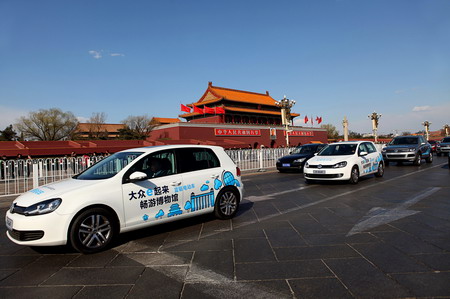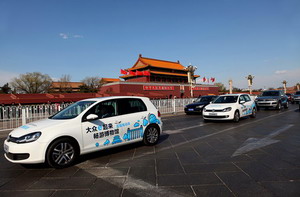The drive to go electric
Updated: 2011-08-10 11:32
By Lan Lan (China Daily)
|
|||||||||||
|
 |
|
A Volkswagen AG electric motorcade offering free travel for passengers at Tian'anmen Square in Beijing on April 6. [Photo / China Daily] |
Fortunately, the gap between Chinese automakers and leading foreign manufacturers of electric cars is about 10 to 15 years, much lower than the 50-year gap in conventional gasoline cars, Liao said.
"Local automakers have to adopt unconventional tactics to overcome the technical barriers in electric-car development," he said.
The Chinese government's ambitious promotion plan - which has no comparable counterpart in any other country - is a big advantage for the domestic industry. "Incentives will not be a long-term solution, but they're crucial in enabling companies to survive in the initial period," Liao added.
China plans to invest 100 billion yuan over the next 10 years to stimulate the new-energy vehicle industry.
Other countries, such as the United States, Japan and Germany, have also geared up to put electric cars on the road soon. The electric car is far from dominant worldwide, but its development is becoming increasingly important as looming energy shortages, greenhouse gas emissions and traffic concerns become ever more worrisome.
The German government has agreed to bolster its electric-auto sector with billions of euros in subsidies and aims to have 1 million new-energy vehicles on the road by 2020. In the United States, the Obama administration also plans to see 1 million electric vehicles in operation by 2015.
International automakers are looking to launch electric cars in China, the most important market for many of them. The models include GM's Chevy Volt and Nissan Motor Co's Leaf. Moreover, the German automaker Volkswagen AG has said it expects to start production of electric cars in China by early 2014.
"Of course, German automakers have put China on their top-priority list, given the huge market and its vast perspective," said Gabriele Kautz, Transport, Building and Urban Development Counselor at the German Embassy in China.
Both Germany and China have started to develop a new car, she said, emphasizing that the move does not involve the development of an existing structure, but is an entirely new concept.
Germany's motoring history serves as an excellent starting point for the successful development of quality electric cars, but China has also put a strong strategic emphasis on electric automobiles, she said.
"The government has put a lot of pressure on this industry at an early stage and it has been appointed an emerging and key industry. I think China has a very good chance of building it up quickly," Kautz said.
"European and Chinese automakers can build a good partnership for cooperation, but it should be a win-win situation on an equal footing for both sides," she added.
A 50/50 joint venture between BYD Co Ltd and Daimler AG's Mercedes-Benz unit is a cooperation pioneer and the venture has already finalized the design of the first BYD-Daimler electric vehicle.
Both sides are cooperating closely on the joint venture, Shenzhen BYD New Technology Co Ltd, according to Ulrich Mellinghoff, head of safety development at Mercedes-Benz, in a recent interview with China Daily.
The German automaker is in charge of the traditional technologies relating to bodywork, suspension and the safety aspects of the new car, while BYD is providing the battery technology.













